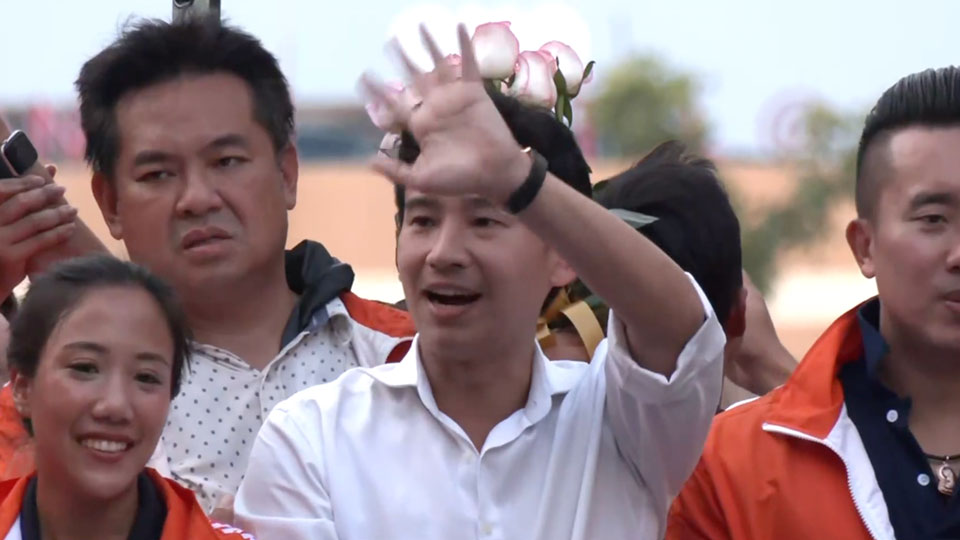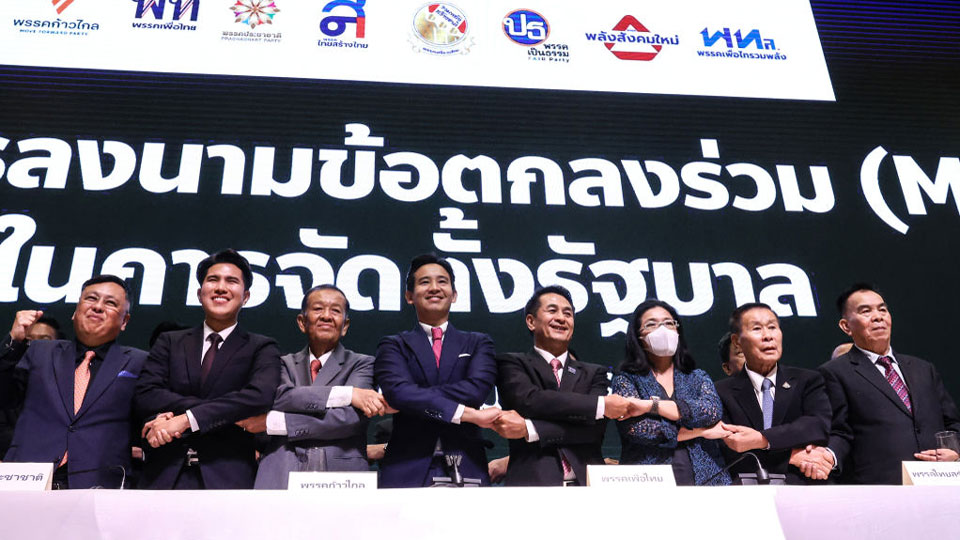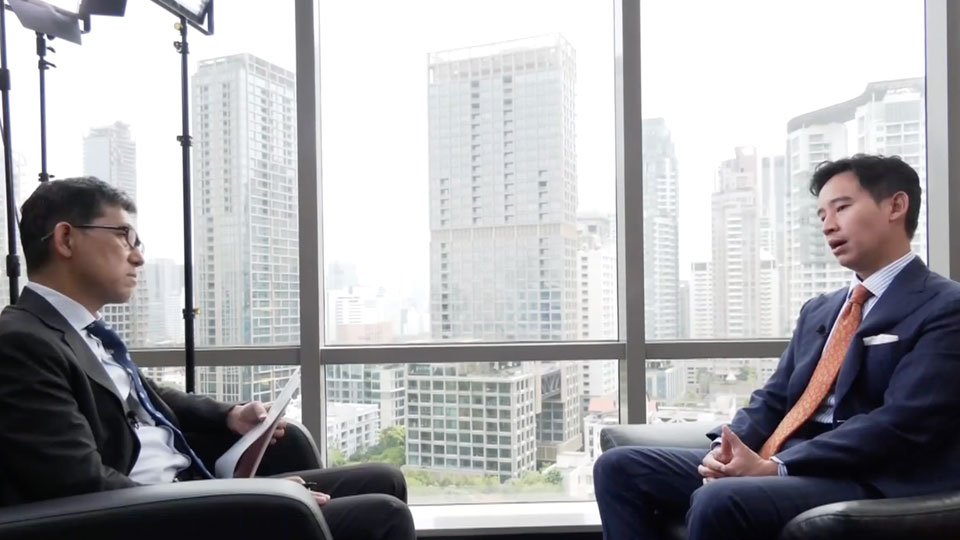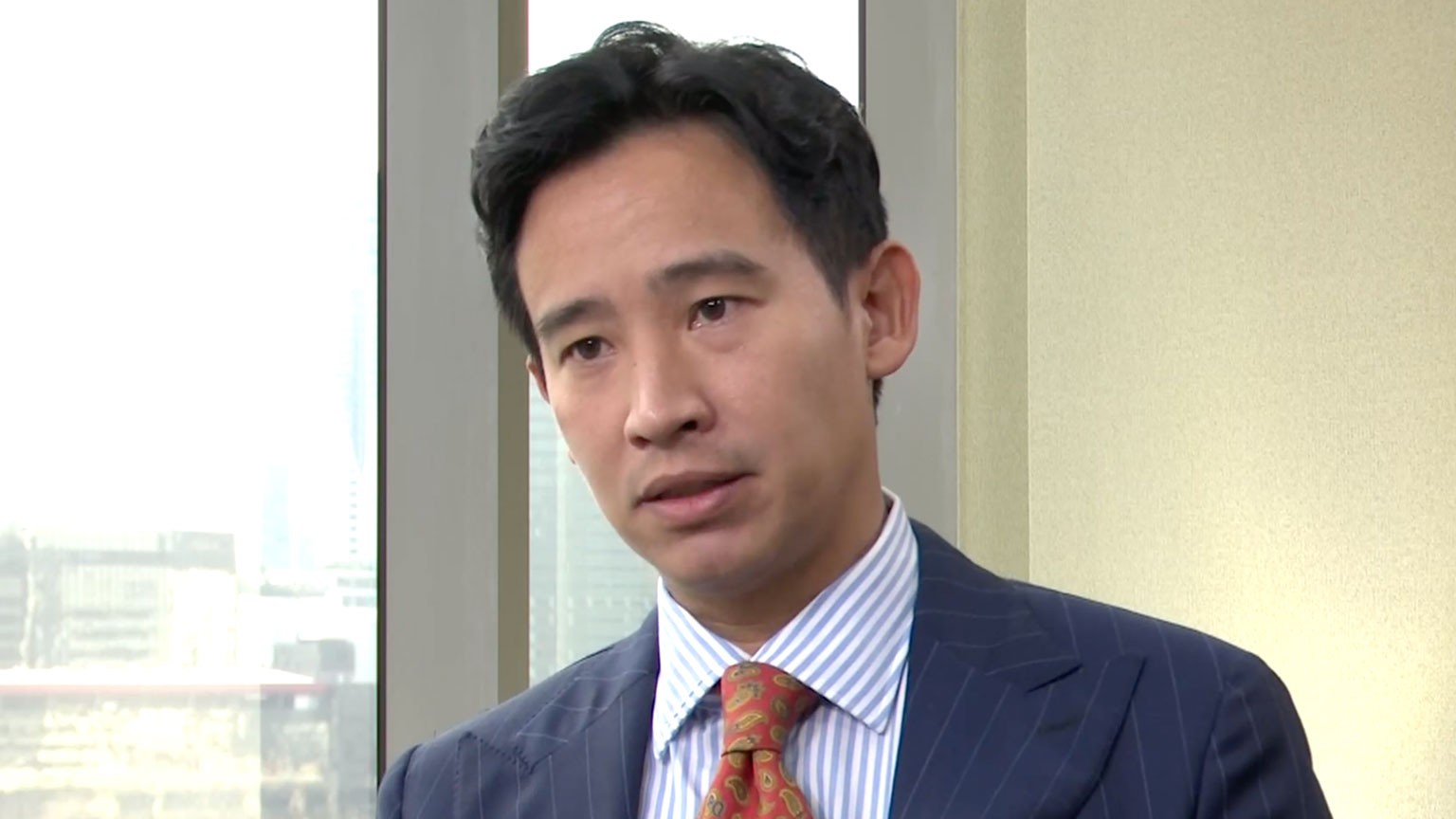Shimazaki Hiroshi: Not many people predicted the Move Forward Party would be so dominant at the election. Do you think the influence of the military [which seized power in a 2014 coup] over the past nine years contributed to your success?
Pita Limjaroenrat: To answer your question directly, I think the past nine years — you know almost a lost decade — was a catalyst for change. It's not really a contribution to success, because currently, Thailand is really in turmoil for a couple of reasons, whether it's economic, whether it's political consensus, whether my coalition is taking shape and gaining momentum as of now. You can really say that in a functioning democracy, it's about the people who got the most mandate.
That does not translate directly into leadership of the country. So I can't really answer your question because of that lost decade. We [don't] consider it a success of the country or my party because we still have a lot of work to do politically, socially, environmentally, educationally, and economically. However, it was definitely a catalyst for change and the people of Thailand have announced that they definitely want to go into the future, rather than back to the past.
Shimazaki: What would you say is the main reason for popular dissatisfaction with the military-linked government?
Pita: Lack of hope, and that's because there's very little linkages between governance and people, very little linkages between parliament and people. In a democracy, to be able to function, you need obviously the executive power, the legislative power, and also the legal power. The three main pillars of any functioning democracy. However, [based on] the executive order during the COVID crisis, it was very clear that there was not a quick enough response in terms of public health.
Second, in terms of parliament, I was very clear that a lot of progressive laws, including labor reforms, educational reform, and environmental reform, did not pass through the parliament, which is deemed [to be] a military-backed, parliament.
And also on the legal side, the rule of law — where you're supposed to be equal in front of the legal system — that's not the case.
[With] all these combined, it becomes a lack of hope. And it showed very clearly in the past three or four years that people are looking for a new consensus in the way we manage things in this country, in order to move forward.
[A] new normal is happening all around the world, in Japan, and in Thailand. If a country can find a new consensus for this new normal, it moves forward, but within Thailand, [due to] the reasons that I articulated for you, it's like a new normal is coming, but it's an old consensus. That's a situation that is currently in Thailand, and That's what I'm trying to fix.

Shimazaki: Let me move to the memorandum of understanding that you signed on Monday with the other parties in your alliance. There has been some criticism that your proposal to amend the lese majeste law (which punishes perceived insults of the monarchy with jail terms) was dropped from the MOU as a kind of compromise. There's a perception that divergent views among the coalition parties will make it very difficult to form government. What's your response to that?
Pita: I think your question is two-fold. One is about the objective of the MOU and the second part is on the lese majeste law.
It is just like in the private sector. MOU stands for memorandum of understanding. It's the shared values, shared goals, and share commonalities where you can find consensus on things. And that's like the minimum of what we can expect from one another when we govern as well as what people can expect, that this is the shared agenda.
However, that MOU doesn't give away the autonomy of pushing any agenda that you had promised to the people. There's a reason why we're in different parties. [There are differences] even in the same party or the same company. Sometimes, you don't see eye to eye, and then you can pursue those specific agendas on your own.
To specifically address the question of Article 112 or the lese majeste law here in Thailand, it has to be amended in the parliament, the legislative pillar, and you will require 20 MPs to submit the law. So we can do it on our own as we had done before two years ago.
So this is not even about election results, because we had done it before the election, two years ahead of time, because we were sincere about the relationship between the monarchy and the masses here in Thailand. How do we improve the relationship between the monarchy and the people, especially the new generation, where the sentiment of the era might have changed? How do we put the royal position or authority in modern times in the 21st century in comparison with constitutional monarchy countries?
It's not really about an MOU. It's not even about the election or not the election, but it's something that [concerns] the goodwill of the people, regardless of any institutions here in Thailand, so that we have the focus, we have the concentration to move this country forward and address the real issues of an aging society, of climate change, of digital disruption, of the pollution that is going on in the world, and also the new definition of globalization.
Shimazaki: The Senate [Thailand's unelected upper house, which is dominated by conservatives] will play a major role in selecting the prime minister. How do you intend to gain its support?
Pita: It's not [that] I intend to gain their support, but the country is supposed to gain their support. It's about the system. It's not a personal situation. So when they voted for me to become the prime minister, it wasn't Pita that they were voting for, but they were voting for righteousness, for a legitimacy of governance that is supposed to be like that.
Now let me backtrack a little bit before you ask the question. It's appointed senators, you know, it's military-appointed senators, which brings us to the question [about] what the old consensus was, as per my previous answer. [It's] the struggle between the politics of elected and appointed.
It's 500 [people elected to the lower house] and 250 senators, and these 500 [are elected by] 40 million people versus the appointed senators that come from a handful of people. Why do we hold elections in the first place?
But realistically, I think we're getting very good momentum. And there are a lot of senators, even if appointed, who have shown their linkages to the will of the people and have come out publicly, 20 or 30 of them as of now, to say they will vote for me, only because they want to protect the legitimacy of the country, of the system, and not just make a personal decision.
And privately there's a couple of them who have contacted the party, my negotiation team. I'm sure that we're in the right direction, given that we have one to two months, but as of now, what we're trying to do is to make sure that we stabilize the country during this transition period, it's very important because there could be a very volatile moment for the financial markets, for the investors that are coming into the country.
So I have my transition team to meet with various stakeholders within Thailand and the international community, just to make sure that the transition of power is going well.
Shimazaki: So far you have the support of 20 to 30 senators?
Pita: At the minimum, and that's public — it's not a secret. I mean, it's been shown to the media, or they have posted comments on their social media, or they have given interviews. So I think we'll be able to come to the consensus that this is not about me. It's about the country, and it's about being a member of ASEAN, a member of Asia, and a member of the world. It's about display, the value of what Thailand is all about. So that's what I'm trying to say. It's not whether you like me or dislike me.
Shimazaki: What would a coalition government mean for democracy in Thailand?
Pita: I think it will be the first step out of many challenges. I think we have to really acknowledge that democracy is difficult, yet it is the best option to take care of various problems.
So, I think that's something that you know, at the beginning of the democratic new chapter, a new frontier of Thailand and ASEAN and Asia, arguably. We have to make sure that the transparency and the faith is returned to politicians, is returned to the government, is returned to the parliament. With all these diverging views and differences in any society, it has to be freely spoken by the representatives of the people in the parliament, with majority tolerance and diversity. And [protecting] that situation by voting or having committees that study issues in order to reach a consensus. And if that is done, I think that that's something that I could call a success for Thailand's democracy.
Shimazaki: You mentioned that the military establishment has had a powerful influence in Thailand for a long time. What sort of change do you want to achieve here?
Pita: That means military reform in order to reduce its influence. I think the necessity of having a defense [force] in Thailand is crucial. Especially from outside, our outside, enemies or outside challenges that are coming from the country, as well as the challenges that are more updated, especially of these scams and technologies and cybersecurity that are coming from abroad is still very important.
However, they should not intervene in internal affairs, especially in politics. So our policies to reform the military, that includes [changes to] military conscription, will reduce the national budget and divert [finances] into new challenges.
It's not just about having a large amount of army personnel that will increase the security of this country. The threat that this country — that both our countries — are facing is more like a new pandemic. Climate change is coming, the aging population, all these things, so we have set aside this budget [that transfers spending from] defense into the domestic economy.
[The military will be] smaller now, very focused. Now that is very professional. Now that it considers human rights and the welfare of the army within the defense pillar. They'll have enough money to upgrade to a newer technology consequential to the new threats of the modern century of the 21st century.
Shimazaki: The military-backed government hasn't received a particularly warm welcome overseas. What would you like to change in this respect?
Pita: I think that's very true. Japan is the number one foreign investor here in Thailand, so I have to thank the Japanese private sector for considering Thailand as a place to invest, but if you look at the trend for the past 10 years, it has gone down very much.
You see Vietnam going up in the past 10 years, and you see Thailand going down. So what's needed? To increase the attractiveness of Thailand to the international community we need three Fs.
First is a firm foundation. The second is fair game. And third is future industries.
So that the fair game of operating in Thailand is back and also future industries (is back).
It's something that is very new, something that is very consequential to the rise of EVs and solar cell panels and something that Thailand is also very interested in. It's something that other countries might not be interested in, but it's something that we could collaborate on in the future. So that's a very, very specific area of collaboration going forward, hopefully, with a three Fs policy we will be able to increase the attractiveness of Thailand to the international community.
Shimazaki: The media is discussing a range of scenarios that could unfold as you try to form a coalition government. In one of those scenarios, your party could be isolated by political rivals that move to gain the support of the Senate. What do you think about that?
Pita: Speculation is speculation and yes, we do scenario analysis ourselves, and we anticipate all the scenarios that have been articulated by the media. I think there are always risks going forward and the way you take care of risks or risk management is to be able to lay out the possibilities and also the strategic responses of how you handle all those different scenarios. But as of now, the probability, realistic probability is of [forming a coalition government.]
The MOU is signed, you know we have a transition team visiting all the various stakeholders. So yes, there's always a possibility or rumor of that not succeeding. But we're very firm in forming up the coalition and also to be able to really address the good team that can address the issues and challenges.

Shimazaki: Are you concerned about the attempt to disqualify you (over allegations of owning media shares, which would preclude him from being an MP)?
Pita: Not concerned but not careless, not concerned in the sense that I prepared it this four, five years ago. And I have my evidence. Still. There was no request from the election committee yet, so I don't know the details of what they're looking for. But once that comes, I will be able to have a strong legal team and strong legal principles and evidence to address the issue. And it's very minuscule in the sense that, the case that is being done here in Thailand is probably unheard of, in any other countries all around the world with a shareholding of 0.0000 to 5%. I can't influence any media to my advantage.
Shimazaki: When it comes to foreign policy of a new coalition government, where would you stand between the US and China?
Pita: I think very much in line with Prime Minister Kishida — and what he said at the G7 [summit in Hiroshima]. I think we have to make clear to the international community that a new world order is rule-based. It's inclusive. We have to really uphold the principle that right makes might and not might make right, and [Kishida's] Hiroshima action plan set that out very clearly. You know, it's unacceptable to us to force a change in the status quo in any region, whether in Asia or Europe. I think the difference between Prime Minister Kishida and myself is the size of our countries. But I think it's time for the middle power to say something about what's going on in terms of polarized competition between major countries, but the middle powers should lead. Middle powers should come out together and stick together in order to make sure that we formed this new world order.

Shmazaki: Apparently, the United States was not happy with the pro-military government in Thailand. Are you hoping to improve ties with the US?
Pita: I intend to improve our relationship with the whole international community, which is the way forward to peace and prosperity. I think I say with caution that foreign affairs is not a buffet. It's an a la carte. It's a tailor-made approach. It's not that it's not about choosing sides. I suspect that your follow-up question will be on China.
But what I'm trying to get at is it's not that it's not about choosing sides, between the Sino-American rivalry. That's not benefiting anyone. But it's about sticking to rule-based diplomacy, it's about sticking to the principles for the mutual benefit of both countries and the international community. So anything that goes against the stability of this region, anything that goes against the progress of having an international community connecting between rich countries and middle-income countries, like the G7 and developing countries, as Prime Minister [Kishida] was trying to do, I think that's not going to be a boon to anyone.
So it's not just about improving the relationship with America or China or Japan or any other countries, but it's about middle powers sticking together so that we have enough volume and value in forming the international practice of foreign affairs.
Shimazaki: How about the possibility of joining other countries that are imposing sanctions on Russia over the Ukraine invasion?
Pita: First of all, it's not just about any particular countries, but we'd have to really find the right amount of pressure and incentives for any particular country to solve problems inclusively and peacefully. Whether sanctions work or not is a very big issue. Whether it would really stop the aggression, whether that will instill peace in the region, whether that will instill the value of right makes might is still another question, but I think what we can be clear without consulting the Ministry of Foreign Affairs, is that no words no wait.
If you keep abstaining when you see something that is wrong, it's something that is against the Geneva Convention for sure. And if you abstain all the time — quiet diplomacy — it doesn't work. It's like, if you don't say something, you don't mean anything. So I think what's clear is that Thailand will be part of the international community and will be vocal, and that will be in line with our values. That's what I can say at the moment.
Shimazaki: Many people regard the next few weeks as crucial for the future of Thailand. How do you intend to use that time to achieve your goal?
Pita: It will be like regular time. Anticipate risk. We have a clear roadmap and have contingency plans. We don't know what the future will be like, but we can anticipate it in various ways. And we have a roadmap that can capitalize on opportunities and prevent threats. And if that doesn't work, we have a contingency plan.
I think that's how you make sure that you have a stable transition and also minimize any destabilizing factors. I think it's a bright future. It's a momentous time-defining moment here in Thailand. So I ask the international community, including Japan, to support what's going on here.
